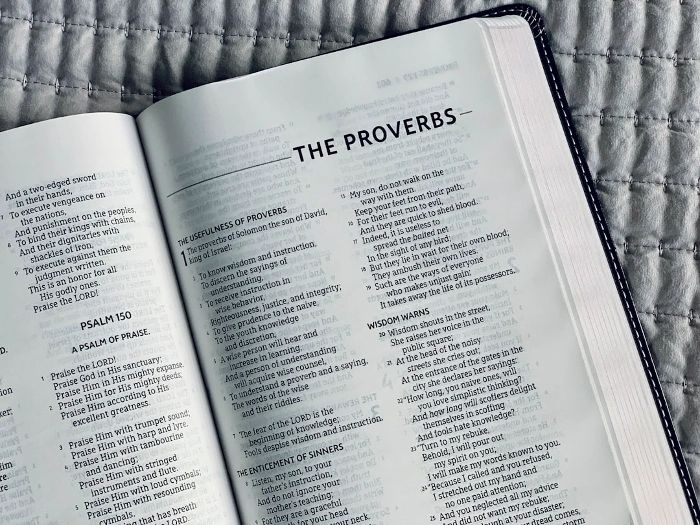Christ, in the book of Proverbs

The book of Proverbs, traditionally attributed to King Solomon, is part of the Wisdom Literature of the Old Testament. It provides practical instructions for living a godly life, emphasizing the importance of wisdom, righteousness, and the fear of the Lord. While Proverbs does not explicitly mention Jesus Christ, Christian theologians and scholars have often interpreted certain passages as foreshadowing or symbolizing Christ and His attributes. This summary explores how Christ is portrayed through themes, personifications, and proverbs in the book.
Wisdom as a Personification of Christ
A central theme in Proverbs is wisdom, often personified in a way that many Christians believe points to Christ. In the New Testament, Paul describes Christ as "the wisdom of God" (1 Corinthians 1:24). This connection provides a foundation for viewing the Wisdom described in Proverbs as a foreshadowing of Christ.
Proverbs 8:22-31
One of the most striking personifications of Wisdom is found in Proverbs 8. Wisdom speaks as a person, describing its existence before creation and its role in the formation of the world:
> "The Lord brought me forth as the first of his works, before his deeds of old; I was formed long ages ago, at the very beginning, when the world came to be" (Proverbs 8:22-23).
This passage resonates with the prologue of the Gospel of John, where Christ (the Word) is described as being with God in the beginning and through whom all things were made (John 1:1-3). The parallels suggest that Wisdom in Proverbs can be seen as a prefiguration of Christ, who embodies divine wisdom and was present with God from the beginning.
Characteristics of Wisdom
Proverbs repeatedly extols the virtues and benefits of wisdom, many of which align with the attributes and works of Christ. Wisdom is portrayed as just, righteous, and life-giving:
> "For wisdom is more precious than rubies, and nothing you desire can compare with her" (Proverbs 8:11).
These attributes mirror the New Testament descriptions of Christ as the ultimate source of life, righteousness, and truth (John 14:6, 1 Corinthians 1:30). Moreover, Wisdom’s invitation to follow her ways and live righteously can be seen as analogous to Christ’s call to discipleship and His teachings on righteous living.
Christ-like Qualities in the Proverbs
While Wisdom is a primary Christ-like figure in Proverbs, other qualities and principles outlined in the book also reflect Christ’s character and teachings.
The Fear of the Lord
A recurring theme in Proverbs is the fear of the Lord, which is described as the beginning of wisdom (Proverbs 1:7, 9:10). This concept is central to the book’s moral and ethical teachings. In the New Testament, the fear of the Lord is also seen as a foundational aspect of a believer’s life, leading to reverence and obedience to God. Christ exemplified perfect reverence for God the Father and taught His followers to do the same.
Righteousness and Justice
Proverbs emphasizes living a righteous and just life. Verses like Proverbs 21:3, "To do righteousness and justice is more acceptable to the Lord than sacrifice," echo the teachings of Christ, who prioritized internal righteousness over external religious observances (Matthew 23:23). Christ's life and ministry were marked by a commitment to justice, compassion, and righteousness, fulfilling the ideals laid out in Proverbs.
Humility
Humility is another key virtue extolled in Proverbs. Proverbs 22:4 states, "Humility is the fear of the Lord; its wages are riches and honor and life." This humility is epitomized in Christ, who, according to Philippians 2:6-8, humbled Himself by taking on human form and submitting to death on the cross. Proverbs' teaching on humility finds its ultimate expression in the life and sacrifice of Jesus.
Practical Wisdom and Christ's Teachings
The practical instructions in Proverbs often parallel Christ’s teachings in the New Testament. For example, Proverbs advises kindness to enemies and generous living:
> "If your enemy is hungry, give him food to eat; if he is thirsty, give him water to drink" (Proverbs 25:21).
This advice is echoed by Christ in the Sermon on the Mount, where He teaches to love enemies and pray for those who persecute you (Matthew 5:44). The alignment between the practical wisdom of Proverbs and the moral teachings of Christ underscores the continuity between the Old Testament wisdom literature and the New Testament gospel.
Conclusion
In conclusion, while the book of Proverbs does not directly reference Jesus Christ, its portrayal of Wisdom provides a profound connection to Him. The personification of Wisdom as eternal, righteous, and life-giving prefigures Christ, whom the New Testament identifies as the embodiment of divine wisdom. Additionally, the virtues extolled in Proverbs—such as the fear of the Lord, righteousness, justice, and humility—are perfectly manifested in the life and teachings of Christ. The practical wisdom offered in Proverbs aligns closely with Christ’s instructions for living a godly life, highlighting the enduring relevance and divine coherence of the biblical message. Through these connections, Proverbs contributes to a deeper understanding of Christ’s character and His role in God’s redemptive plan.